中考一轮教材复习课件 七年级下(Units 1-6)(20张)
文档属性
| 名称 | 中考一轮教材复习课件 七年级下(Units 1-6)(20张) | 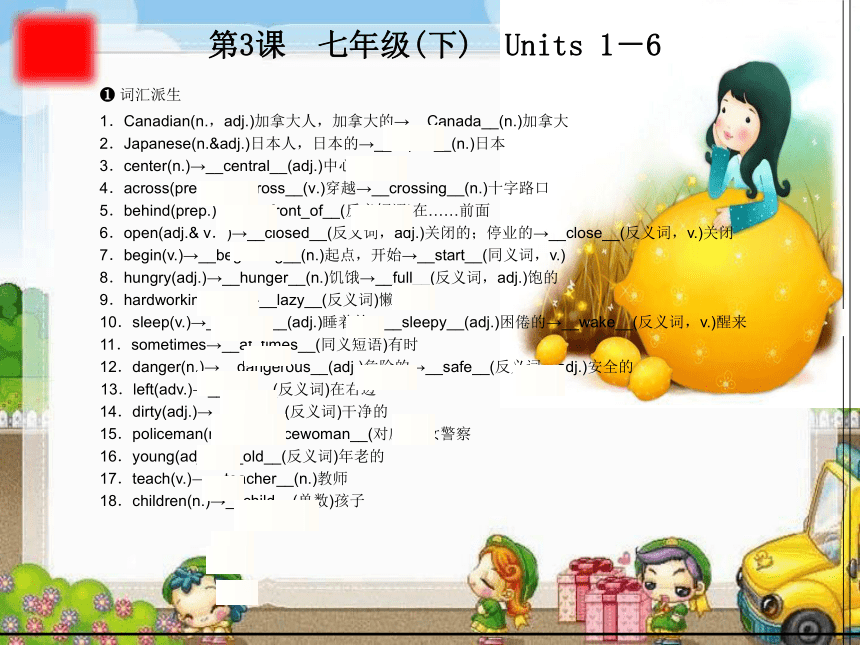 | |
| 格式 | zip | ||
| 文件大小 | 220.3KB | ||
| 资源类型 | 教案 | ||
| 版本资源 | |||
| 科目 | 英语 | ||
| 更新时间 | 2014-03-20 11:46:03 | ||
图片预览

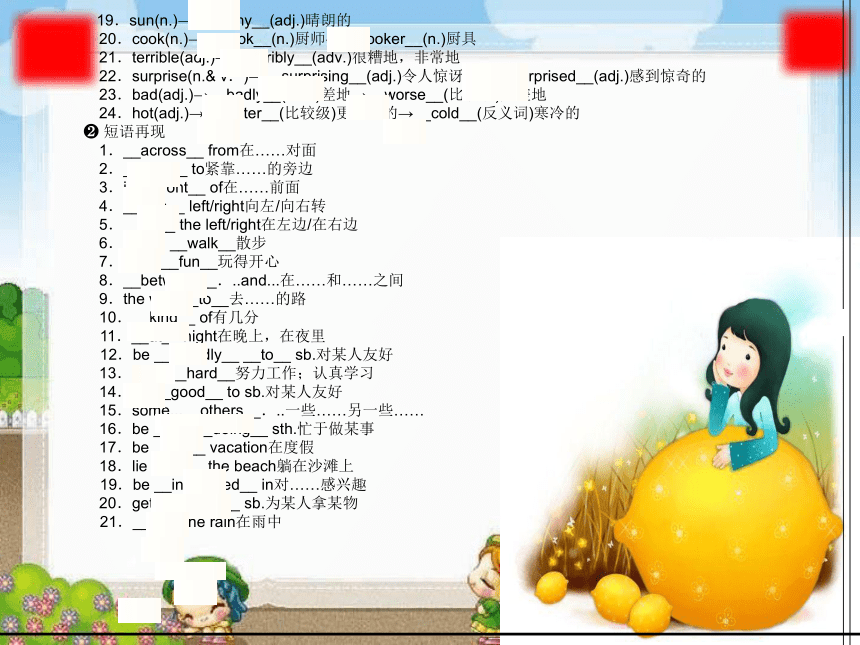

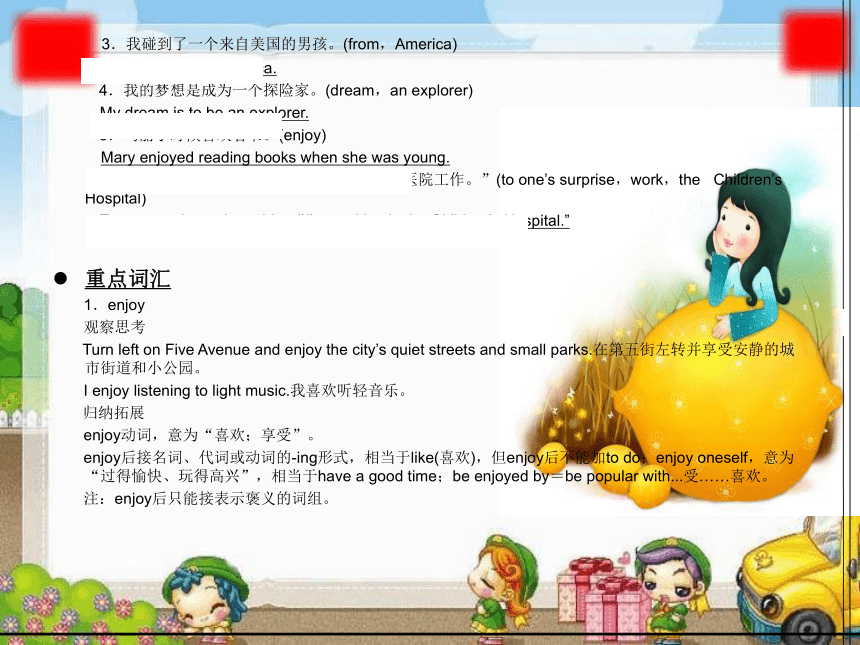
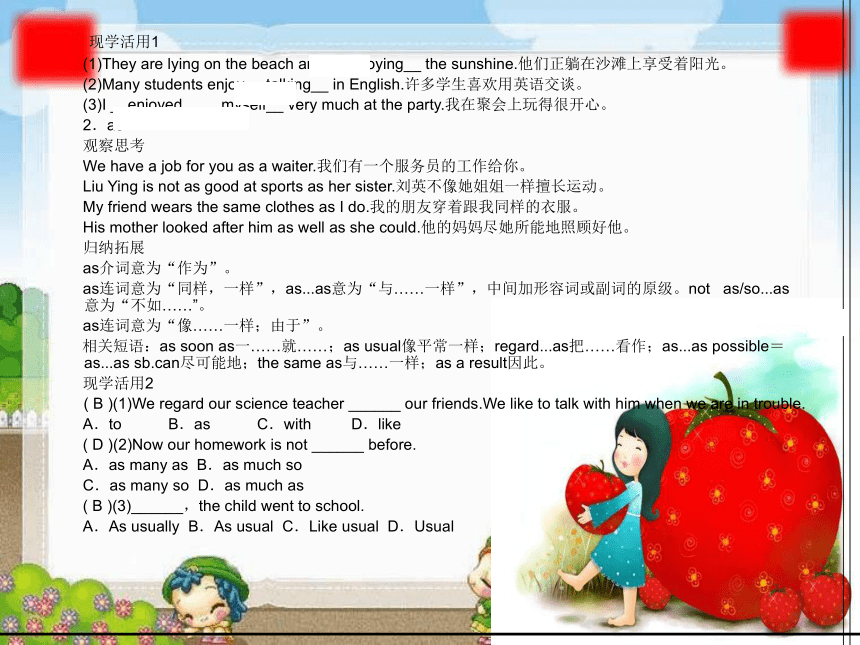
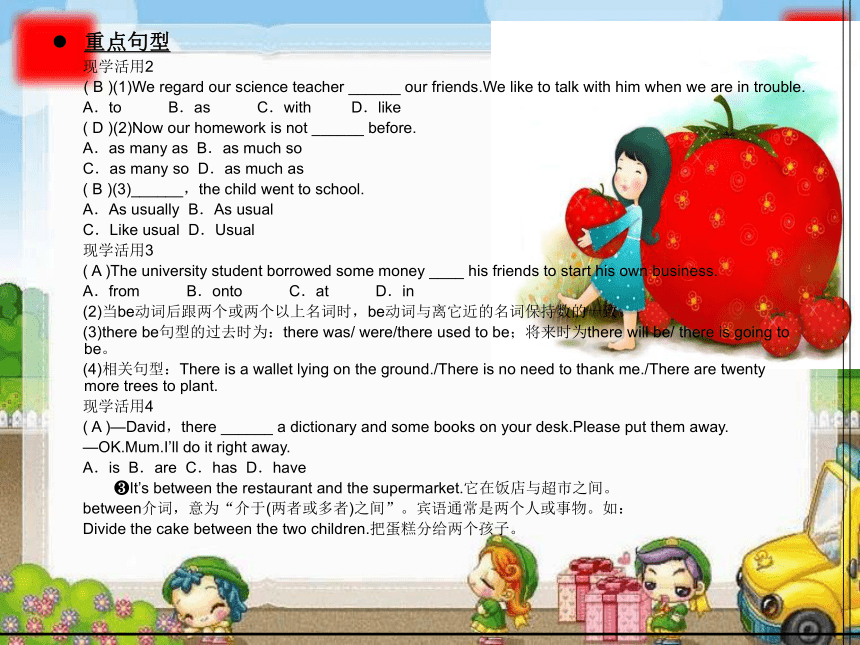
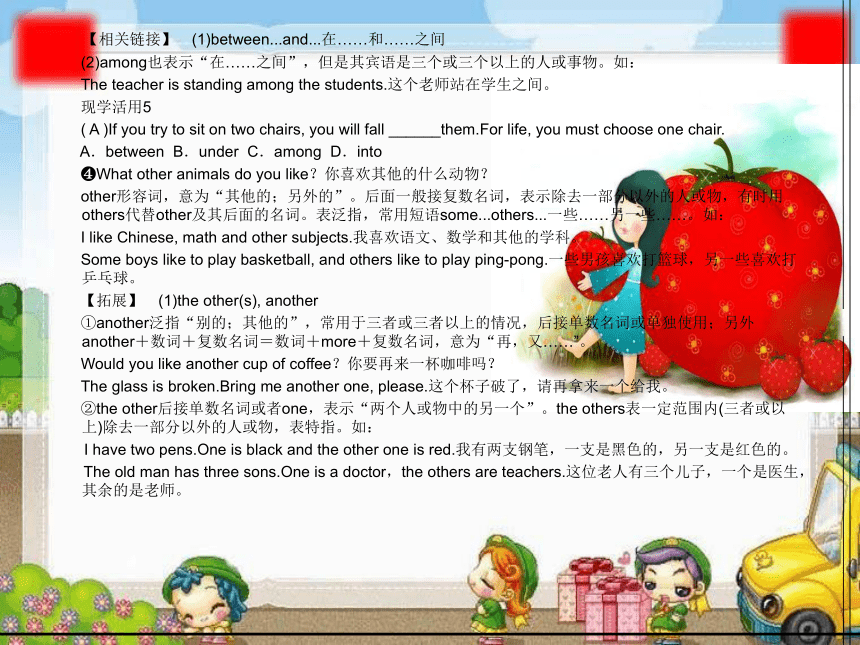
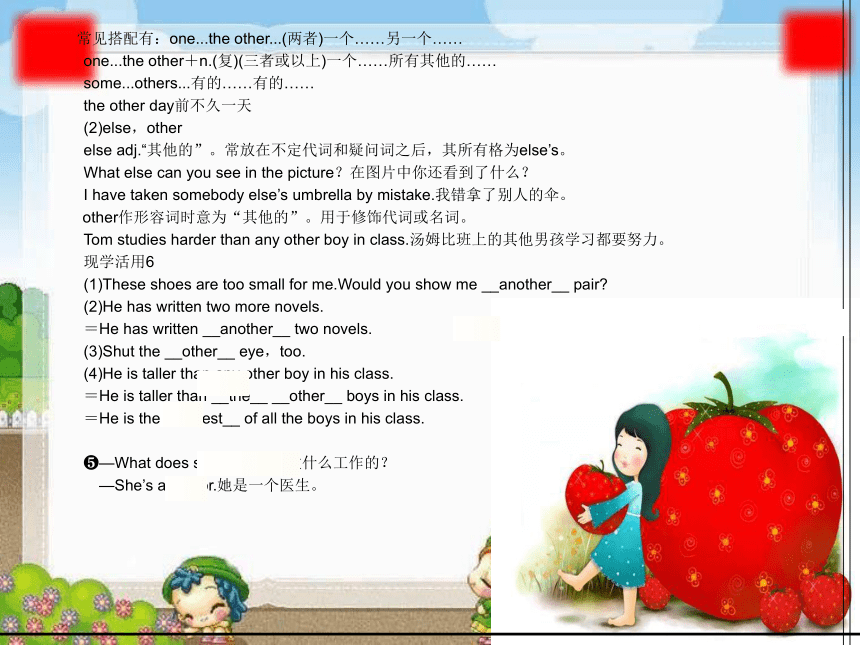
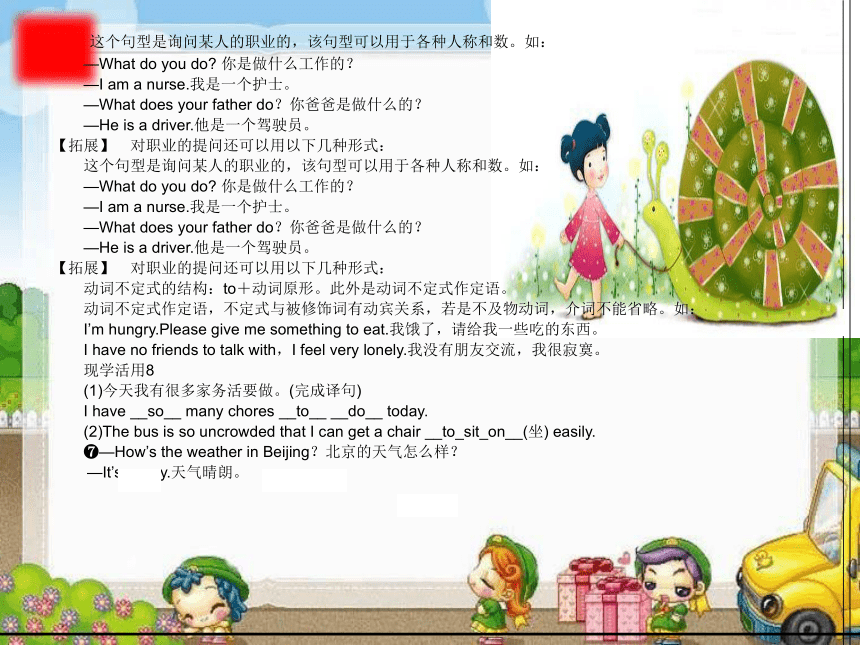
文档简介
课件20张PPT。第3课 七年级(下) Units 1-6
? 词汇派生
1.Canadian(n.,adj.)加拿大人,加拿大的→__Canada__(n.)加拿大
2.Japanese(n.&adj.)日本人,日本的→__Japan__(n.)日本
3.center(n.)→__central__(adj.)中心的
4.across(prep.)→__cross__(v.)穿越→__crossing__(n.)十字路口
5.behind(prep.)→__in_front_of__(反义短语)在……前面
6.open(adj.& v.)→__closed__(反义词,adj.)关闭的;停业的→__close__(反义词,v.)关闭
7.begin(v.)→__beginning__(n.)起点,开始→__start__(同义词,v.)
8.hungry(adj.)→__hunger__(n.)饥饿→__full__(反义词,adj.)饱的
9.hardworking(adj.)→__lazy__(反义词)懒惰的
10.sleep(v.)→__asleep__(adj.)睡着的→__sleepy__(adj.)困倦的→__wake__(反义词,v.)醒来
11.sometimes→__at_times__(同义短语)有时
12.danger(n.)→__dangerous__(adj.)危险的→__safe__(反义词,adj.)安全的
13.left(adv.)→__right__(反义词)在右边
14.dirty(adj.)→__clean__(反义词)干净的
15.policeman(n.)→__policewoman__(对应词)女警察
16.young(adj.)→__old__(反义词)年老的
17.teach(v.)→__teacher__(n.)教师
18.children(n.)→__child__(单数)孩子 19.sun(n.)→__sunny__(adj.)晴朗的
20.cook(n.)→__cook__(n.)厨师→__cooker__(n.)厨具
21.terrible(adj.)→__terribly__(adv.)很糟地,非常地
22.surprise(n.& v.)→__surprising__(adj.)令人惊讶的→__surprised__(adj.)感到惊奇的
23.bad(adj.)→__badly__(adv.)差地→__worse__(比较级)更差地
24.hot(adj.)→__hotter__(比较级)更炎热的→__cold__(反义词)寒冷的
? 短语再现
1.__across__ from在……对面
2.__next__ to紧靠……的旁边
3.in __front__ of在……前面
4.__turn__ left/right向左/向右转
5.__on__ the left/right在左边/在右边
6.take a __walk__散步
7.have __fun__玩得开心
8.__between__...and...在……和……之间
9.the way __to__去……的路
10.__kind__ of有几分
11.__at__ night在晚上,在夜里
12.be __friendly__ __to__ sb.对某人友好
13.work __hard__努力工作;认真学习
14.be __good__ to sb.对某人友好
15.some...__others__...一些……另一些……
16.be __busy_doing__ sth.忙于做某事
17.be __on__ vacation在度假
18.lie __on__ the beach躺在沙滩上
19.be __interested__ in对……感兴趣
20.get sth. __for__ sb.为某人拿某物
21.__in__ the rain在雨中 ? 句式回顾
根据句意或提示完成句子。(每空一词,含缩略词)
1.—Where’s the post office?
—It’s __close_to__/__next_to__/ __across_from__/__near__ your house.(它在你家隔壁/对面/附近。)
2.—__Why__ do you like koalas?
—Because they are cute.
3.—__What__ does he __do__?(他是做什么工作的?)
—He’s a waiter.
—What do you want __to__ __be__?
—I want to be an actor.
4.Please call him __at__ 555-3937.请拨555-3937找他。
5.Here __are__ some of my __photos__.这里有一些我的照片。
6.—__How’s__ the weather in Beijing?/__What’s__ the weather __like__ in Beijing?北京的天气怎么样?
—It’s raining/rainy.正在下雨。
7.—How __is__ it __going__?情况怎么样?
—__Great__.很好。
? 知识活用
翻译句子。
1.玛丽的妈妈为我们做了好吃的东西。(cook,something delicious)
Mary’s mother cooked something delicious for us.
2.在聚会上我们玩得很开心。(enjoy oneself)
We_enjoyed_ourselves_in_the_party.__ 3.我碰到了一个来自美国的男孩。(from,America)
I met a boy from America.
4.我的梦想是成为一个探险家。(dream,an explorer)
My dream is to be an explorer.
5.玛丽小时候喜欢看书。(enjoy)
Mary enjoyed reading books when she was young.
6.出乎我的意料之外,她说:“我正在儿童医院工作。”(to one’s surprise,work,the Children’s Hospital)
To my surprise,she said,“I’m working in the Children’s Hospital.”
重点词汇
1.enjoy
观察思考
Turn left on Five Avenue and enjoy the city’s quiet streets and small parks.在第五街左转并享受安静的城市街道和小公园。
I enjoy listening to light music.我喜欢听轻音乐。
归纳拓展
enjoy动词,意为“喜欢;享受”。
enjoy后接名词、代词或动词的-ing形式,相当于like(喜欢),但enjoy后不能加to do;enjoy oneself,意为“过得愉快、玩得高兴”,相当于have a good time;be enjoyed by=be popular with...受……喜欢。
注:enjoy后只能接表示褒义的词组。
现学活用1
(1)They are lying on the beach and __enjoying__ the sunshine.他们正躺在沙滩上享受着阳光。
(2)Many students enjoy __talking__ in English.许多学生喜欢用英语交谈。
(3)I __enjoyed__ __myself__ very much at the party.我在聚会上玩得很开心。
2.as
观察思考
We have a job for you as a waiter.我们有一个服务员的工作给你。
Liu Ying is not as good at sports as her sister.刘英不像她姐姐一样擅长运动。
My friend wears the same clothes as I do.我的朋友穿着跟我同样的衣服。
His mother looked after him as well as she could.他的妈妈尽她所能地照顾好他。
归纳拓展
as介词意为“作为”。
as连词意为“同样,一样”,as...as意为“与……一样”,中间加形容词或副词的原级。not as/so...as意为“不如……”。
as连词意为“像……一样;由于”。
相关短语:as soon as一……就……;as usual像平常一样;regard...as把……看作;as...as possible=as...as sb.can尽可能地;the same as与……一样;as a result因此。
现学活用2
( B )(1)We regard our science teacher ______ our friends.We like to talk with him when we are in trouble.
A.to B.as C.with D.like
( D )(2)Now our homework is not ______ before.
A.as many as B.as much so
C.as many so D.as much as
( B )(3)______,the child went to school.
A.As usually B.As usual C.Like usual D.Usual重点句型
现学活用2
( B )(1)We regard our science teacher ______ our friends.We like to talk with him when we are in trouble.
A.to B.as C.with D.like
( D )(2)Now our homework is not ______ before.
A.as many as B.as much so
C.as many so D.as much as
( B )(3)______,the child went to school.
A.As usually B.As usual
C.Like usual D.Usual
现学活用3
( A )The university student borrowed some money ____ his friends to start his own business.
A.from B.onto C.at D.in
(2)当be动词后跟两个或两个以上名词时,be动词与离它近的名词保持数的一致。
(3)there be句型的过去时为:there was/ were/there used to be;将来时为there will be/ there is going to be。
(4)相关句型:There is a wallet lying on the ground./There is no need to thank me./There are twenty more trees to plant.
现学活用4
( A )—David,there ______ a dictionary and some books on your desk.Please put them away.
—OK.Mum.I’ll do it right away.
A.is B.are C.has D.have
?It’s between the restaurant and the supermarket.它在饭店与超市之间。
between介词,意为“介于(两者或多者)之间”。宾语通常是两个人或事物。如:
Divide the cake between the two children.把蛋糕分给两个孩子。 【相关链接】 (1)between...and...在……和……之间
(2)among也表示“在……之间”,但是其宾语是三个或三个以上的人或事物。如:
The teacher is standing among the students.这个老师站在学生之间。
现学活用5
( A )If you try to sit on two chairs, you will fall ______them.For life, you must choose one chair.
A.between B.under C.among D.into
?What other animals do you like?你喜欢其他的什么动物?
other形容词,意为“其他的;另外的”。后面一般接复数名词,表示除去一部分以外的人或物,有时用others代替other及其后面的名词。表泛指,常用短语some...others...一些……另一些……。如:
I like Chinese, math and other subjects.我喜欢语文、数学和其他的学科。
Some boys like to play basketball, and others like to play ping-pong.一些男孩喜欢打篮球,另一些喜欢打乒乓球。
【拓展】 (1)the other(s), another
①another泛指“别的;其他的”,常用于三者或三者以上的情况,后接单数名词或单独使用;另外another+数词+复数名词=数词+more+复数名词,意为“再,又……”。
Would you like another cup of coffee?你要再来一杯咖啡吗?
The glass is broken.Bring me another one, please.这个杯子破了,请再拿来一个给我。
②the other后接单数名词或者one,表示“两个人或物中的另一个”。the others表一定范围内(三者或以上)除去一部分以外的人或物,表特指。如:
I have two pens.One is black and the other one is red.我有两支钢笔,一支是黑色的,另一支是红色的。
The old man has three sons.One is a doctor,the others are teachers.这位老人有三个儿子,一个是医生,其余的是老师。 常见搭配有:one...the other...(两者)一个……另一个……
one...the other+n.(复)(三者或以上)一个……所有其他的……
some...others...有的……有的……
the other day前不久一天
(2)else,other
else adj.“其他的”。常放在不定代词和疑问词之后,其所有格为else’s。
What else can you see in the picture?在图片中你还看到了什么?
I have taken somebody else’s umbrella by mistake.我错拿了别人的伞。
other作形容词时意为“其他的”。用于修饰代词或名词。
Tom studies harder than any other boy in class.汤姆比班上的其他男孩学习都要努力。
现学活用6
(1)These shoes are too small for me.Would you show me __another__ pair?
(2)He has written two more novels.
=He has written __another__ two novels.
(3)Shut the __other__ eye,too.
(4)He is taller than any other boy in his class.
=He is taller than __the__ __other__ boys in his class.
=He is the __tallest__ of all the boys in his class.
?—What does she do?她是做什么工作的?
—She’s a doctor.她是一个医生。 这个句型是询问某人的职业的,该句型可以用于各种人称和数。如:
—What do you do? 你是做什么工作的?
—I am a nurse.我是一个护士。
—What does your father do?你爸爸是做什么的?
—He is a driver.他是一个驾驶员。
【拓展】 对职业的提问还可以用以下几种形式:
这个句型是询问某人的职业的,该句型可以用于各种人称和数。如:
—What do you do? 你是做什么工作的?
—I am a nurse.我是一个护士。
—What does your father do?你爸爸是做什么的?
—He is a driver.他是一个驾驶员。
【拓展】 对职业的提问还可以用以下几种形式:
动词不定式的结构:to+动词原形。此外是动词不定式作定语。
动词不定式作定语,不定式与被修饰词有动宾关系,若是不及物动词,介词不能省略。如:
I’m hungry.Please give me something to eat.我饿了,请给我一些吃的东西。
I have no friends to talk with,I feel very lonely.我没有朋友交流,我很寂寞。
现学活用8
(1)今天我有很多家务活要做。(完成译句)
I have __so__ many chores __to__ __do__ today.
(2)The bus is so uncrowded that I can get a chair __to_sit_on__(坐) easily.
?—How’s the weather in Beijing?北京的天气怎么样?
—It’s sunny.天气晴朗。 “How’s the weather?天气如何?”是用来询问天气情况的常用句型,与What’s the weather like?相同。其回答用It’s +表示天气的形容词/It+实义动词+adv./There be+名词(天气)/The weather+be+表示天气的形容词。如:
—How’s the weather today?今天天气如何?
—The wind is blowing strongly./The sun is shining brightly./It’s raining hard(heavily).
现学活用9
(1)There will be a strong wind tomorrow.
=The __wind__ will blow(吹) __strongly__ tomorrow.
(2)It was very rainy last night.
=It __rained__ __hard__ last night.
=__The__ __rain__ was very __heavy__ last night.
(3)The sun is shining brightly today.
=It’s __very__ __sunny__ today.
易混辩异
?across,through,past,over
观察思考
(1)The boss walked past me without saying a word at half past one.I don’t know why.一点半的时候,老板一声不吭地从我身边经过,我不知为什么。
(2)The sunshine is shining in through the window.阳光透过窗户照进来。
(3)Going across the bridge means crossing the bridge.从桥上走过的意思就是过桥。 (4)They climbed over the tall wall,didn’t they?他们翻越了那面高墙,是吗?
归纳拓展
across从表面横穿而过,具有on的含义。
through从里面横穿而过,具有in的含义。
past从旁边经过(walk past/run past)。
over从空间“翻越”。jump over/climb over
现学活用10
(1)The two men run __through__ the forest.
(2)Walk __across__ the bridge,and you will see a big building.
(3)When I walked __past__ him,I found something strange on his face.
(4)The horse jumped __over__ a fence and ran away.
?sleeping,asleep,sleepy
观察思考
Mr.Li is sleeping,please call him later.李先生正在睡觉,请稍后再打电话给他。
The children are asleep now.现在孩子们睡着了。
On Friday afternoons,many students are sleepy after a long week of classes.经过长长一周的课程后,很多学生在星期五下午都是困倦的。
归纳拓展
be sleeping表示动作,意为“正在睡觉”,不确定是否睡着。
be asleep表示状态,意为“睡着了”。fall asleep入睡,表瞬间动作。
sleepy形容词,意为“困倦的”。 go to bed,go to sleep均表瞬间动作,表示“去睡觉”。
现学活用11
(1)Don’t make noises,the baby __is__ __sleeping__.
(2)He was so tired that he fell __asleep__ at once.
(3)Because he stayed up to watch the football match,he felt __sleepy__ during the next day.
?arrive,get,reach
观察思考
They reached London on Friday.他们星期五到达了伦敦。
Lucy got to the zoo before 8 o’clock露西八点前到了动物园。
It was late when I got home.我到家时天色已晚。
When did your parents arrive in Shanghai?你父母何时到上海的?
When did she arrive here last time?她上次是什么时候到这儿的?
归纳拓展
三者都有“到达”之意。reach是及物动词,后直接跟宾语;get to后加地点名词,若跟地点副词时,去掉to;arrive at+小地方,arrive in+大地方,副词前省略介词at或in。
注:没有表地点的宾语时,只能用arrive。若接here,there,home等副词,arrive后不加介词。如:
When did they arrive home yesterday?他们昨天什么时候到家的?
现学活用12
(1)The passengers were worried because the train didn’t __arrive__ on time.
(2)Please call me when you __reach__ Shanghai.
(3)Please tell me when you’ll __arrive__ in Wuhan.I’ll meet you at the airport.
?put on,wear,dress,in,have on
He put on his coat.他穿上了他的外套。
The girl is wearing a red skirt.那女孩穿着一条红色的短裙。
Please dress the children right now.请立即给孩子们穿上衣服。
John is in white today.约翰今天穿白色的衣服。
The emperor had nothing on.这皇帝什么也没有穿。
归纳拓展
put on主要表达“穿”的动作,后接衣服。反义词为take off。
wear主要表示“穿、戴”的状态,后接衣服。be wearing=be in。
dress意为“给……穿衣”,后接人。
have on也可表“穿着,戴着”,指状态相当于wear,只是不用于进行时态。
相关短语:get dressed穿戴好,dress up(as)装扮(成),be dressed in=be in。
be in表示穿着的状态。后接“衣服”,或“颜色”。接颜色表示“穿着某一颜色的衣服”。
现学活用13
(1)The old man __wearing__ a pair of glasses is my grandfather.
(2)__Put_on__ your sports shoes.It’s time to do sports.
(3)He is old enough to __dress__ himself.
(4)The man __in__ black is a football coach.
?surprise,surprised,surprising
观察思考
We want to give you a surprise.我们想要给你一个惊喜。
To his surprise,this phone call changed his life.出乎他的意料之外,这个电话改变了他的生活。 I don’t want to surprise him.我不想吓到他。
I am surprised to see him.我惊奇地看见了他。
The surprising thing was to hear how many animals are in danger.令人惊讶的事情是听到如此多的动物濒临灭绝。
归纳拓展
surprise名词,意为“惊讶”,to one’s(great) surprise“(大大)出于某人意料之外”(一般作插入语,放在句首,用逗号隔开);in surprise“惊讶地”表示方式和态度。surprise前用不定冠词“a”,意为“令人惊讶的事”。如:What a surprise!多么惊奇的事啊!
surprise动词,意为“使……惊讶”。
surprised形容词,意为“感到惊讶的”,描述人的情绪或状态。surprising形容词,意为“令人惊讶的”,描述物或事。
现学活用14
( C )(1)To our ______,he failed in the test.
A.surprised B.surprising
C.surprise D.surprises
( C )(2)We are ______ to hear the ______ result.
A.surprised;surprised B.surprising;surprising
C.surprised;surprising D.surprising;surprised
写作指导
通知的写作
一、通知一般可分为口头通知和书面通知两种。通知的内容一般可分为五个部分:
1.标题:通知的正上方通常要有一个标题。口头通知常用Annoucement,书面通知多用Notice。
2.日期:口头通知因是现场发布,不需要日期,但书面通知要写明日期。布告式通知的日期一般写在最后一行,即在右下角,要低于落款。书信式通知的日期可写在右上角。 3.称呼语:口头通知往往要有称呼语,如Boys and girls, Ladies and gentlemen, Dear students等。
4.正文:通知正方所使用的语言应尽量简明扼要。通知的开头要交代清楚活动的内容、对象、时间和地点,通常称之为四“W”,即who, what, when, where。通知的语言有“四多一少”现象,即:被动语态多,将来时态多,简单句多,祈使句多,修饰性词语少。
5.落款:口头通知一般不用落款;书面通知要有落款,即要写上发出通知的人或单位名称,一般写在正文的右下角。
二、常用句型
1.May I have/ call your attention, please? 请注意!
2.I have something important to tell you. 我有重要的事情告诉你(们)。
3.Would you mind... 你介意……吗?
4.Dear classmates. I’m very glad to tell you that... 亲爱的同学们,我非常高兴地告诉你们……
5.Don’t forget to... 不要忘了……
6.Please be there on time and don’t be late. 请准时到达那里,不要迟到。
7.That’s all. Thank you! 完了,谢谢!
三、写作模板
________(日期)
Annoucement/Notice(标题)
________(称呼)
I’m glad to tell you that ____________________(交代时间、地点等)。
Please ____________________(提出要求、希望等)。Do be ____________(表示强调).
________(落款)
四、范文欣赏
请你以学校学生会的身份,写一份通知,内容如下: 1.原定于本周六举行的运动会由于这些天的大雨不得不推迟;
2.所有学生周六早上照常到校,但那天下午没课;
3.如果天气好的话,运动会将于下周六早上举行;
4.校篮球队成员必须于本周六下午3∶00到体育馆。届时,来自美国的篮球明星将会到来并给予你们特别训练和指导。
Dear students,
The sports meeting which was to take place this Saturday has to be put off because of the heavy rain these days. All students are supposed to come to school on Saturday morning as usual, but there will be no class that afternoon. If weather permits, the sports meeting will be held next Saturday morning. Members of the school basketball team must come to the gymnasium at 3∶00 this Saturday afternoon. Basketball stars from America will come and give you special training and coaching then.
The Student Union
当堂演练
Ⅰ.用所给词的形式填空。
1.The movie was boring.I fell __asleep__(sleep) half way through it.
2.We will have fun __learning__(learn) English with Miss Lin’s help this term.
3.Most of the young people enjoy __watching__(watch) football matches.
4.That shop has __been_open__(open) for three hours.
5.The boy used to sleep with the windows __closed__(close).
6.I was really __surprised__(surprise) to find that the five-year-old boy had learnt more than 20,000 words.
7.Some people like pop music,and __others__(other) like classical music. 8.It’s __dangerous__(danger) to run across the road,when the traffic lights are red.
9.—Are you feeling better today,dear?
—No,even __worse__(bad).
Ⅱ.单项选择。
( B )1.There ______ many trees in front of my house now.(2013·北京)
A.is B.are C.was D.were
( A )2.The volunteer spoke as ______ as she could to make the visitors understand her.(2013·上海)
A.clearly B.more clearly
C.most clearly D.the most clearly
( C )3.Before the bridge was built ______ the river, the villagers had to take a boat to the other side.(2013·丽水)
A.in B.beside C.across D.along
( B )4.The workers will build a new railroad ______ the two cities.(2013·天津)
A.since B.between C.as D.during
( D )5.—______ weather it is! We can’t go boating on the Xuanwu Lake.
—Don’t worry. Let’s go to the Science Museum instead.(2013·南京)
A.What good B.How good
C.How bad D.What bad
( C )6.—Mary, does your brother get ______ work by bus?
—No, he rides a bike. Sometimes he walks.(2013·济南)
A.in B.on C.to D.for ( B )7.—I left my keys in the room yesterday.I had to get in ______ the window.
—It’s dangerous to do that.(2012·河南)
A.in B.through C.over D.to
( D )8.—Do you know ______?
—He is a dentist.(2013·黄冈)
A.where he is from
B.where is he from
C.what does his father do
D.what his father is
( C )9.My family has two dogs. One is white; ______ is black.(2013·孝感)
A.other B.another C.the other D.others
( A )10.In the past few years there ______ great changes in my hometown.
A.have been B.were
C.had been D.are
( B )11.What ______ news it is! Nobody ______ it.(2013·烟台)
A.in B.through C.over D.to
( D )8.—Do you know ______?
—He is a dentist.(2013·黄冈)
A.where he is from
B.where is he from
C.what does his father do
D.what his father is
( C )9.My family has two dogs. One is white; ______ is black.(2013·孝感)
A.other B.another C.the other D.others
( A )10.In the past few years there ______ great changes in my hometown.
A.have been B.were
C.had been D.are
( B )11.What ______ news it is! Nobody ______ it.(2013·烟台)
A.a surprising; believes B.surprising; believes
C.a surprised; believe D.surprised; believe
( A )12.Why are you ______ a T-shirt? You’ll probably catch a cold in this very cold weather.(2013·枣庄)
A.wearing B.recycling
C.pulling D.selling
Ⅲ.口语应用。(2012·哈尔滨)
从A-G选项中选出能填入空白处的最佳选项补全对话。(选项中有两项是多余的)
A:Hi,Tongtong!
B:Hi,Bruce!__1__
A:Very well,thank you.
B:I know the 30th Olympic Games is coming next month.__2__
A:Yes,that’s right.
B:Will you go back to your hometown soon?
A:Of course.And I will be a guide during the Olympics.
B:__3__ I was once a guide in the 2008 Beijing Olympics,too.
A:Thank you!__4__
B:Sure!We can help people to find their ways.Also,we can introduce the places of interest to the friends both at home and overseas. A:Excellent!I hope to become a guide like you!__5__ Thanks a lot!
B:You are welcome!
A.Would you please tell me what to do as a guide?
B.What would you like to do?
C.How are you doing?
D.It will be held in your country,won’t it?
E.Oh,congratulations!
F.It’s very nice of you to tell me so much.
G.I’m afraid not.
1.C 2.D 3.E 4.A 5 .F
课后测评 【见测试篇】
? 词汇派生
1.Canadian(n.,adj.)加拿大人,加拿大的→__Canada__(n.)加拿大
2.Japanese(n.&adj.)日本人,日本的→__Japan__(n.)日本
3.center(n.)→__central__(adj.)中心的
4.across(prep.)→__cross__(v.)穿越→__crossing__(n.)十字路口
5.behind(prep.)→__in_front_of__(反义短语)在……前面
6.open(adj.& v.)→__closed__(反义词,adj.)关闭的;停业的→__close__(反义词,v.)关闭
7.begin(v.)→__beginning__(n.)起点,开始→__start__(同义词,v.)
8.hungry(adj.)→__hunger__(n.)饥饿→__full__(反义词,adj.)饱的
9.hardworking(adj.)→__lazy__(反义词)懒惰的
10.sleep(v.)→__asleep__(adj.)睡着的→__sleepy__(adj.)困倦的→__wake__(反义词,v.)醒来
11.sometimes→__at_times__(同义短语)有时
12.danger(n.)→__dangerous__(adj.)危险的→__safe__(反义词,adj.)安全的
13.left(adv.)→__right__(反义词)在右边
14.dirty(adj.)→__clean__(反义词)干净的
15.policeman(n.)→__policewoman__(对应词)女警察
16.young(adj.)→__old__(反义词)年老的
17.teach(v.)→__teacher__(n.)教师
18.children(n.)→__child__(单数)孩子 19.sun(n.)→__sunny__(adj.)晴朗的
20.cook(n.)→__cook__(n.)厨师→__cooker__(n.)厨具
21.terrible(adj.)→__terribly__(adv.)很糟地,非常地
22.surprise(n.& v.)→__surprising__(adj.)令人惊讶的→__surprised__(adj.)感到惊奇的
23.bad(adj.)→__badly__(adv.)差地→__worse__(比较级)更差地
24.hot(adj.)→__hotter__(比较级)更炎热的→__cold__(反义词)寒冷的
? 短语再现
1.__across__ from在……对面
2.__next__ to紧靠……的旁边
3.in __front__ of在……前面
4.__turn__ left/right向左/向右转
5.__on__ the left/right在左边/在右边
6.take a __walk__散步
7.have __fun__玩得开心
8.__between__...and...在……和……之间
9.the way __to__去……的路
10.__kind__ of有几分
11.__at__ night在晚上,在夜里
12.be __friendly__ __to__ sb.对某人友好
13.work __hard__努力工作;认真学习
14.be __good__ to sb.对某人友好
15.some...__others__...一些……另一些……
16.be __busy_doing__ sth.忙于做某事
17.be __on__ vacation在度假
18.lie __on__ the beach躺在沙滩上
19.be __interested__ in对……感兴趣
20.get sth. __for__ sb.为某人拿某物
21.__in__ the rain在雨中 ? 句式回顾
根据句意或提示完成句子。(每空一词,含缩略词)
1.—Where’s the post office?
—It’s __close_to__/__next_to__/ __across_from__/__near__ your house.(它在你家隔壁/对面/附近。)
2.—__Why__ do you like koalas?
—Because they are cute.
3.—__What__ does he __do__?(他是做什么工作的?)
—He’s a waiter.
—What do you want __to__ __be__?
—I want to be an actor.
4.Please call him __at__ 555-3937.请拨555-3937找他。
5.Here __are__ some of my __photos__.这里有一些我的照片。
6.—__How’s__ the weather in Beijing?/__What’s__ the weather __like__ in Beijing?北京的天气怎么样?
—It’s raining/rainy.正在下雨。
7.—How __is__ it __going__?情况怎么样?
—__Great__.很好。
? 知识活用
翻译句子。
1.玛丽的妈妈为我们做了好吃的东西。(cook,something delicious)
Mary’s mother cooked something delicious for us.
2.在聚会上我们玩得很开心。(enjoy oneself)
We_enjoyed_ourselves_in_the_party.__ 3.我碰到了一个来自美国的男孩。(from,America)
I met a boy from America.
4.我的梦想是成为一个探险家。(dream,an explorer)
My dream is to be an explorer.
5.玛丽小时候喜欢看书。(enjoy)
Mary enjoyed reading books when she was young.
6.出乎我的意料之外,她说:“我正在儿童医院工作。”(to one’s surprise,work,the Children’s Hospital)
To my surprise,she said,“I’m working in the Children’s Hospital.”
重点词汇
1.enjoy
观察思考
Turn left on Five Avenue and enjoy the city’s quiet streets and small parks.在第五街左转并享受安静的城市街道和小公园。
I enjoy listening to light music.我喜欢听轻音乐。
归纳拓展
enjoy动词,意为“喜欢;享受”。
enjoy后接名词、代词或动词的-ing形式,相当于like(喜欢),但enjoy后不能加to do;enjoy oneself,意为“过得愉快、玩得高兴”,相当于have a good time;be enjoyed by=be popular with...受……喜欢。
注:enjoy后只能接表示褒义的词组。
现学活用1
(1)They are lying on the beach and __enjoying__ the sunshine.他们正躺在沙滩上享受着阳光。
(2)Many students enjoy __talking__ in English.许多学生喜欢用英语交谈。
(3)I __enjoyed__ __myself__ very much at the party.我在聚会上玩得很开心。
2.as
观察思考
We have a job for you as a waiter.我们有一个服务员的工作给你。
Liu Ying is not as good at sports as her sister.刘英不像她姐姐一样擅长运动。
My friend wears the same clothes as I do.我的朋友穿着跟我同样的衣服。
His mother looked after him as well as she could.他的妈妈尽她所能地照顾好他。
归纳拓展
as介词意为“作为”。
as连词意为“同样,一样”,as...as意为“与……一样”,中间加形容词或副词的原级。not as/so...as意为“不如……”。
as连词意为“像……一样;由于”。
相关短语:as soon as一……就……;as usual像平常一样;regard...as把……看作;as...as possible=as...as sb.can尽可能地;the same as与……一样;as a result因此。
现学活用2
( B )(1)We regard our science teacher ______ our friends.We like to talk with him when we are in trouble.
A.to B.as C.with D.like
( D )(2)Now our homework is not ______ before.
A.as many as B.as much so
C.as many so D.as much as
( B )(3)______,the child went to school.
A.As usually B.As usual C.Like usual D.Usual重点句型
现学活用2
( B )(1)We regard our science teacher ______ our friends.We like to talk with him when we are in trouble.
A.to B.as C.with D.like
( D )(2)Now our homework is not ______ before.
A.as many as B.as much so
C.as many so D.as much as
( B )(3)______,the child went to school.
A.As usually B.As usual
C.Like usual D.Usual
现学活用3
( A )The university student borrowed some money ____ his friends to start his own business.
A.from B.onto C.at D.in
(2)当be动词后跟两个或两个以上名词时,be动词与离它近的名词保持数的一致。
(3)there be句型的过去时为:there was/ were/there used to be;将来时为there will be/ there is going to be。
(4)相关句型:There is a wallet lying on the ground./There is no need to thank me./There are twenty more trees to plant.
现学活用4
( A )—David,there ______ a dictionary and some books on your desk.Please put them away.
—OK.Mum.I’ll do it right away.
A.is B.are C.has D.have
?It’s between the restaurant and the supermarket.它在饭店与超市之间。
between介词,意为“介于(两者或多者)之间”。宾语通常是两个人或事物。如:
Divide the cake between the two children.把蛋糕分给两个孩子。 【相关链接】 (1)between...and...在……和……之间
(2)among也表示“在……之间”,但是其宾语是三个或三个以上的人或事物。如:
The teacher is standing among the students.这个老师站在学生之间。
现学活用5
( A )If you try to sit on two chairs, you will fall ______them.For life, you must choose one chair.
A.between B.under C.among D.into
?What other animals do you like?你喜欢其他的什么动物?
other形容词,意为“其他的;另外的”。后面一般接复数名词,表示除去一部分以外的人或物,有时用others代替other及其后面的名词。表泛指,常用短语some...others...一些……另一些……。如:
I like Chinese, math and other subjects.我喜欢语文、数学和其他的学科。
Some boys like to play basketball, and others like to play ping-pong.一些男孩喜欢打篮球,另一些喜欢打乒乓球。
【拓展】 (1)the other(s), another
①another泛指“别的;其他的”,常用于三者或三者以上的情况,后接单数名词或单独使用;另外another+数词+复数名词=数词+more+复数名词,意为“再,又……”。
Would you like another cup of coffee?你要再来一杯咖啡吗?
The glass is broken.Bring me another one, please.这个杯子破了,请再拿来一个给我。
②the other后接单数名词或者one,表示“两个人或物中的另一个”。the others表一定范围内(三者或以上)除去一部分以外的人或物,表特指。如:
I have two pens.One is black and the other one is red.我有两支钢笔,一支是黑色的,另一支是红色的。
The old man has three sons.One is a doctor,the others are teachers.这位老人有三个儿子,一个是医生,其余的是老师。 常见搭配有:one...the other...(两者)一个……另一个……
one...the other+n.(复)(三者或以上)一个……所有其他的……
some...others...有的……有的……
the other day前不久一天
(2)else,other
else adj.“其他的”。常放在不定代词和疑问词之后,其所有格为else’s。
What else can you see in the picture?在图片中你还看到了什么?
I have taken somebody else’s umbrella by mistake.我错拿了别人的伞。
other作形容词时意为“其他的”。用于修饰代词或名词。
Tom studies harder than any other boy in class.汤姆比班上的其他男孩学习都要努力。
现学活用6
(1)These shoes are too small for me.Would you show me __another__ pair?
(2)He has written two more novels.
=He has written __another__ two novels.
(3)Shut the __other__ eye,too.
(4)He is taller than any other boy in his class.
=He is taller than __the__ __other__ boys in his class.
=He is the __tallest__ of all the boys in his class.
?—What does she do?她是做什么工作的?
—She’s a doctor.她是一个医生。 这个句型是询问某人的职业的,该句型可以用于各种人称和数。如:
—What do you do? 你是做什么工作的?
—I am a nurse.我是一个护士。
—What does your father do?你爸爸是做什么的?
—He is a driver.他是一个驾驶员。
【拓展】 对职业的提问还可以用以下几种形式:
这个句型是询问某人的职业的,该句型可以用于各种人称和数。如:
—What do you do? 你是做什么工作的?
—I am a nurse.我是一个护士。
—What does your father do?你爸爸是做什么的?
—He is a driver.他是一个驾驶员。
【拓展】 对职业的提问还可以用以下几种形式:
动词不定式的结构:to+动词原形。此外是动词不定式作定语。
动词不定式作定语,不定式与被修饰词有动宾关系,若是不及物动词,介词不能省略。如:
I’m hungry.Please give me something to eat.我饿了,请给我一些吃的东西。
I have no friends to talk with,I feel very lonely.我没有朋友交流,我很寂寞。
现学活用8
(1)今天我有很多家务活要做。(完成译句)
I have __so__ many chores __to__ __do__ today.
(2)The bus is so uncrowded that I can get a chair __to_sit_on__(坐) easily.
?—How’s the weather in Beijing?北京的天气怎么样?
—It’s sunny.天气晴朗。 “How’s the weather?天气如何?”是用来询问天气情况的常用句型,与What’s the weather like?相同。其回答用It’s +表示天气的形容词/It+实义动词+adv./There be+名词(天气)/The weather+be+表示天气的形容词。如:
—How’s the weather today?今天天气如何?
—The wind is blowing strongly./The sun is shining brightly./It’s raining hard(heavily).
现学活用9
(1)There will be a strong wind tomorrow.
=The __wind__ will blow(吹) __strongly__ tomorrow.
(2)It was very rainy last night.
=It __rained__ __hard__ last night.
=__The__ __rain__ was very __heavy__ last night.
(3)The sun is shining brightly today.
=It’s __very__ __sunny__ today.
易混辩异
?across,through,past,over
观察思考
(1)The boss walked past me without saying a word at half past one.I don’t know why.一点半的时候,老板一声不吭地从我身边经过,我不知为什么。
(2)The sunshine is shining in through the window.阳光透过窗户照进来。
(3)Going across the bridge means crossing the bridge.从桥上走过的意思就是过桥。 (4)They climbed over the tall wall,didn’t they?他们翻越了那面高墙,是吗?
归纳拓展
across从表面横穿而过,具有on的含义。
through从里面横穿而过,具有in的含义。
past从旁边经过(walk past/run past)。
over从空间“翻越”。jump over/climb over
现学活用10
(1)The two men run __through__ the forest.
(2)Walk __across__ the bridge,and you will see a big building.
(3)When I walked __past__ him,I found something strange on his face.
(4)The horse jumped __over__ a fence and ran away.
?sleeping,asleep,sleepy
观察思考
Mr.Li is sleeping,please call him later.李先生正在睡觉,请稍后再打电话给他。
The children are asleep now.现在孩子们睡着了。
On Friday afternoons,many students are sleepy after a long week of classes.经过长长一周的课程后,很多学生在星期五下午都是困倦的。
归纳拓展
be sleeping表示动作,意为“正在睡觉”,不确定是否睡着。
be asleep表示状态,意为“睡着了”。fall asleep入睡,表瞬间动作。
sleepy形容词,意为“困倦的”。 go to bed,go to sleep均表瞬间动作,表示“去睡觉”。
现学活用11
(1)Don’t make noises,the baby __is__ __sleeping__.
(2)He was so tired that he fell __asleep__ at once.
(3)Because he stayed up to watch the football match,he felt __sleepy__ during the next day.
?arrive,get,reach
观察思考
They reached London on Friday.他们星期五到达了伦敦。
Lucy got to the zoo before 8 o’clock露西八点前到了动物园。
It was late when I got home.我到家时天色已晚。
When did your parents arrive in Shanghai?你父母何时到上海的?
When did she arrive here last time?她上次是什么时候到这儿的?
归纳拓展
三者都有“到达”之意。reach是及物动词,后直接跟宾语;get to后加地点名词,若跟地点副词时,去掉to;arrive at+小地方,arrive in+大地方,副词前省略介词at或in。
注:没有表地点的宾语时,只能用arrive。若接here,there,home等副词,arrive后不加介词。如:
When did they arrive home yesterday?他们昨天什么时候到家的?
现学活用12
(1)The passengers were worried because the train didn’t __arrive__ on time.
(2)Please call me when you __reach__ Shanghai.
(3)Please tell me when you’ll __arrive__ in Wuhan.I’ll meet you at the airport.
?put on,wear,dress,in,have on
He put on his coat.他穿上了他的外套。
The girl is wearing a red skirt.那女孩穿着一条红色的短裙。
Please dress the children right now.请立即给孩子们穿上衣服。
John is in white today.约翰今天穿白色的衣服。
The emperor had nothing on.这皇帝什么也没有穿。
归纳拓展
put on主要表达“穿”的动作,后接衣服。反义词为take off。
wear主要表示“穿、戴”的状态,后接衣服。be wearing=be in。
dress意为“给……穿衣”,后接人。
have on也可表“穿着,戴着”,指状态相当于wear,只是不用于进行时态。
相关短语:get dressed穿戴好,dress up(as)装扮(成),be dressed in=be in。
be in表示穿着的状态。后接“衣服”,或“颜色”。接颜色表示“穿着某一颜色的衣服”。
现学活用13
(1)The old man __wearing__ a pair of glasses is my grandfather.
(2)__Put_on__ your sports shoes.It’s time to do sports.
(3)He is old enough to __dress__ himself.
(4)The man __in__ black is a football coach.
?surprise,surprised,surprising
观察思考
We want to give you a surprise.我们想要给你一个惊喜。
To his surprise,this phone call changed his life.出乎他的意料之外,这个电话改变了他的生活。 I don’t want to surprise him.我不想吓到他。
I am surprised to see him.我惊奇地看见了他。
The surprising thing was to hear how many animals are in danger.令人惊讶的事情是听到如此多的动物濒临灭绝。
归纳拓展
surprise名词,意为“惊讶”,to one’s(great) surprise“(大大)出于某人意料之外”(一般作插入语,放在句首,用逗号隔开);in surprise“惊讶地”表示方式和态度。surprise前用不定冠词“a”,意为“令人惊讶的事”。如:What a surprise!多么惊奇的事啊!
surprise动词,意为“使……惊讶”。
surprised形容词,意为“感到惊讶的”,描述人的情绪或状态。surprising形容词,意为“令人惊讶的”,描述物或事。
现学活用14
( C )(1)To our ______,he failed in the test.
A.surprised B.surprising
C.surprise D.surprises
( C )(2)We are ______ to hear the ______ result.
A.surprised;surprised B.surprising;surprising
C.surprised;surprising D.surprising;surprised
写作指导
通知的写作
一、通知一般可分为口头通知和书面通知两种。通知的内容一般可分为五个部分:
1.标题:通知的正上方通常要有一个标题。口头通知常用Annoucement,书面通知多用Notice。
2.日期:口头通知因是现场发布,不需要日期,但书面通知要写明日期。布告式通知的日期一般写在最后一行,即在右下角,要低于落款。书信式通知的日期可写在右上角。 3.称呼语:口头通知往往要有称呼语,如Boys and girls, Ladies and gentlemen, Dear students等。
4.正文:通知正方所使用的语言应尽量简明扼要。通知的开头要交代清楚活动的内容、对象、时间和地点,通常称之为四“W”,即who, what, when, where。通知的语言有“四多一少”现象,即:被动语态多,将来时态多,简单句多,祈使句多,修饰性词语少。
5.落款:口头通知一般不用落款;书面通知要有落款,即要写上发出通知的人或单位名称,一般写在正文的右下角。
二、常用句型
1.May I have/ call your attention, please? 请注意!
2.I have something important to tell you. 我有重要的事情告诉你(们)。
3.Would you mind... 你介意……吗?
4.Dear classmates. I’m very glad to tell you that... 亲爱的同学们,我非常高兴地告诉你们……
5.Don’t forget to... 不要忘了……
6.Please be there on time and don’t be late. 请准时到达那里,不要迟到。
7.That’s all. Thank you! 完了,谢谢!
三、写作模板
________(日期)
Annoucement/Notice(标题)
________(称呼)
I’m glad to tell you that ____________________(交代时间、地点等)。
Please ____________________(提出要求、希望等)。Do be ____________(表示强调).
________(落款)
四、范文欣赏
请你以学校学生会的身份,写一份通知,内容如下: 1.原定于本周六举行的运动会由于这些天的大雨不得不推迟;
2.所有学生周六早上照常到校,但那天下午没课;
3.如果天气好的话,运动会将于下周六早上举行;
4.校篮球队成员必须于本周六下午3∶00到体育馆。届时,来自美国的篮球明星将会到来并给予你们特别训练和指导。
Dear students,
The sports meeting which was to take place this Saturday has to be put off because of the heavy rain these days. All students are supposed to come to school on Saturday morning as usual, but there will be no class that afternoon. If weather permits, the sports meeting will be held next Saturday morning. Members of the school basketball team must come to the gymnasium at 3∶00 this Saturday afternoon. Basketball stars from America will come and give you special training and coaching then.
The Student Union
当堂演练
Ⅰ.用所给词的形式填空。
1.The movie was boring.I fell __asleep__(sleep) half way through it.
2.We will have fun __learning__(learn) English with Miss Lin’s help this term.
3.Most of the young people enjoy __watching__(watch) football matches.
4.That shop has __been_open__(open) for three hours.
5.The boy used to sleep with the windows __closed__(close).
6.I was really __surprised__(surprise) to find that the five-year-old boy had learnt more than 20,000 words.
7.Some people like pop music,and __others__(other) like classical music. 8.It’s __dangerous__(danger) to run across the road,when the traffic lights are red.
9.—Are you feeling better today,dear?
—No,even __worse__(bad).
Ⅱ.单项选择。
( B )1.There ______ many trees in front of my house now.(2013·北京)
A.is B.are C.was D.were
( A )2.The volunteer spoke as ______ as she could to make the visitors understand her.(2013·上海)
A.clearly B.more clearly
C.most clearly D.the most clearly
( C )3.Before the bridge was built ______ the river, the villagers had to take a boat to the other side.(2013·丽水)
A.in B.beside C.across D.along
( B )4.The workers will build a new railroad ______ the two cities.(2013·天津)
A.since B.between C.as D.during
( D )5.—______ weather it is! We can’t go boating on the Xuanwu Lake.
—Don’t worry. Let’s go to the Science Museum instead.(2013·南京)
A.What good B.How good
C.How bad D.What bad
( C )6.—Mary, does your brother get ______ work by bus?
—No, he rides a bike. Sometimes he walks.(2013·济南)
A.in B.on C.to D.for ( B )7.—I left my keys in the room yesterday.I had to get in ______ the window.
—It’s dangerous to do that.(2012·河南)
A.in B.through C.over D.to
( D )8.—Do you know ______?
—He is a dentist.(2013·黄冈)
A.where he is from
B.where is he from
C.what does his father do
D.what his father is
( C )9.My family has two dogs. One is white; ______ is black.(2013·孝感)
A.other B.another C.the other D.others
( A )10.In the past few years there ______ great changes in my hometown.
A.have been B.were
C.had been D.are
( B )11.What ______ news it is! Nobody ______ it.(2013·烟台)
A.in B.through C.over D.to
( D )8.—Do you know ______?
—He is a dentist.(2013·黄冈)
A.where he is from
B.where is he from
C.what does his father do
D.what his father is
( C )9.My family has two dogs. One is white; ______ is black.(2013·孝感)
A.other B.another C.the other D.others
( A )10.In the past few years there ______ great changes in my hometown.
A.have been B.were
C.had been D.are
( B )11.What ______ news it is! Nobody ______ it.(2013·烟台)
A.a surprising; believes B.surprising; believes
C.a surprised; believe D.surprised; believe
( A )12.Why are you ______ a T-shirt? You’ll probably catch a cold in this very cold weather.(2013·枣庄)
A.wearing B.recycling
C.pulling D.selling
Ⅲ.口语应用。(2012·哈尔滨)
从A-G选项中选出能填入空白处的最佳选项补全对话。(选项中有两项是多余的)
A:Hi,Tongtong!
B:Hi,Bruce!__1__
A:Very well,thank you.
B:I know the 30th Olympic Games is coming next month.__2__
A:Yes,that’s right.
B:Will you go back to your hometown soon?
A:Of course.And I will be a guide during the Olympics.
B:__3__ I was once a guide in the 2008 Beijing Olympics,too.
A:Thank you!__4__
B:Sure!We can help people to find their ways.Also,we can introduce the places of interest to the friends both at home and overseas. A:Excellent!I hope to become a guide like you!__5__ Thanks a lot!
B:You are welcome!
A.Would you please tell me what to do as a guide?
B.What would you like to do?
C.How are you doing?
D.It will be held in your country,won’t it?
E.Oh,congratulations!
F.It’s very nice of you to tell me so much.
G.I’m afraid not.
1.C 2.D 3.E 4.A 5 .F
课后测评 【见测试篇】
